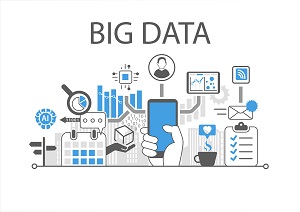Hiring for big data might sound strange to many business owners, but in reality, it can be crucial to your business’s growth. Today, big data is transforming many industries, from those in the health sector to those in manufacturing and retail. With all the benefits big data provides, it’s time you considered hiring a professional or team to tackle the big data side of your business, whatever industry it is in. Here are some things you should consider through your hiring process.
Employee Role
As an employer, there are two types of big data employees you’ve probably heard of: data scientists and data analysts. Both these types of data professionals come with different skill sets and can be of use in different aspects of your business. That being said, although these types of data hires are the ones people are most familiar with, they only just scratch the surface when it comes to big data professionals. Let’s take a deeper dive into the various roles of big data employees:
Marketing Analyst
Many organizations tend to confuse marketing analysts and data analysts, assuming that a data analyst can simply execute marketing activities. This is far from the truth. According to this article comparing marketing analysts and data analysts, “The main difference between marketing analyst and data scientist is that marketing analyst should be a native marketing-speaker with professional skills in driving insights to answer the marketer’s needs.”
The key point here is that a marketing analyst should have a strong background in marketing practices, and then be able to leverage big data within the spectrum of marketing. Even though this role requires the understanding and use of business intelligence platforms, analytics, and SQL/coding; marketing experience is a crucial factor when it comes to hiring the best marketing analyst for your company.
Chris Dowsett, Head of Marketing Analytics and Decision Science at Instagram details a day in the life of a marketing analyst. From cluster analysis to reviewing dashboards and trends to collaborating with product analysts and building machine learning tools, a market analyst has a range of responsibilities all rooted in the objective of improving marketing strategy.
From this account, it is clear that the role of a marketing analyst is extremely diverse, and is a role that, to quote Dowsett, can “drive multi-million dollar decisions.” With this in mind, you will want to carefully consider your options when it comes to hiring a market analyst, ensuring that they have the skills to take your organization’s marketing efforts to the next level.
Healthcare Data Specialist
Healthcare is another industry that has been revolutionized by big data. In fact, an article on Heath Catalyst states that about 30% of all warehoused data is gleaned from the healthcare industry. For consumers, the use of data in healthcare is of growing importance. It allows for faster and more accurate diagnoses, thus resulting in better and more useful treatment options.
As an example, Health Catalyst cites effort by Mission Health, that “leveraged machine learning to develop a predictive model based on its own patient population … With a machine learning model that used its own population, Mission improved its readmission risk prediction to outperform LACE and achieve a readmission rate of 1.2 percentage points lower than its top hospital peers.” This was only possible due to the data gathered on their relevant own population first.
Thus, the responsibilities of a healthcare data specialist are abundant, and can truly affect human lives. In short, healthcare data specialists are in charge of gathering and analyzing data from a variety of sources — health records, bills, surveys and more — and then relaying insights gleaned from this data to decision-making executives.
Contrary to popular belief, healthcare data specialists are not only employable in healthcare companies. Their skills can be utilized within big pharmaceuticals, specific health service providers, non-profit organizations that focus on community health, insurance companies, medical research organizations, academic institutions and more. If you work in an industry that is even tangentially connected to the health and well-being of humanity, you might want to consider hiring a healthcare data specialist to add to your data team.
Financial Data Analyst
Big data affects finance in a myriad of ways. From mom-and-pop stores to large corporations, most organizations deal with finances in one way or another. Thus, financial data analysts can be a transformative asset to almost any organization.
In recent years, experts from Longview have noticed that “To deal with this ever-increasing influx of data, organizations are incorporating trained data professionals and analysts into their financial teams.” According to them, professionals with both business and data skills are more adept at making strategic decisions that ultimately help their companies succeed.
Financial data analysts are these professionals and have certain key skills including data analytics and quantitative analysis, real-time analytics skills, and the ability to strategically think in financial terms. Many financial data analysts come from a background in accounting, thanks to which they are already well-versed in numbers and data. Often, financial data analysts hold the coveted title of a Chartered Financial Analyst (CFA), which is considered a huge advantage for most business careers. This is something you might want to actively seek out when hiring for this position.
These are just three possible roles you could consider when it comes to hiring big data employees. Use these as a springboard to further tailor your big data team to suit your specific needs. Remember, big data is a growing field, and so, there are numerous specialized career paths within this sphere.
Employee Location
Another thing to consider when it comes to big data hiring is the location of your data employees. In many cases, businesses choose to let their data team work off-site or even out of their own homes. If your data team doesn’t need to collaborate much with other departments, this might be of interest to you, as an allowance for remote work is shown to significantly lower operational costs. Additionally, a study quoted by Forbes states that “two-thirds of employees are more productive when they work remotely.”
These findings are corroborated by reams of other research, most of which concludes that allowing employees to work remotely boosts productivity, improves employee retention and keeps employees more satisfied. However, when hiring remote data professionals, you need to consider whether your remote professionals have access to the amenities needed to work smoothly. A high-speed internet connection, for example, is a necessity when it comes to data work. Be sure to check whether a potential remote hire has the software and hardware (both online and offline) to perform their work optimally. If not, is it in your best interest to provide these resources for your employees?
On the other hand, it might make more sense to hire a data professional who works in-house, especially for work that requires collaboration. Many big companies did in fact allow for remote work, only to revoke the decision soon after. Yahoo and Reddit are two examples of such companies that recently banned remote work for their software professionals. According to Tech Beacon, reasons for this included the need for better communication, and to quote Reddit’s CEO, “remote didn’t work simply because there were too many times when we just needed to be able to walk over and tap someone on the shoulder and discuss a complex issue in-depth, right away.”
As is true with all things, there are both pros and cons for each side in the debate between remote versus in-house data professionals. Based on the needs of your company, only you can decide which option will work for you.
Conclusion
To conclude, there are many things you need to consider when hiring for big data. Thinking about the nature of your organization, the potential roles, and responsibilities of your data employees, what you aim to achieve through the use of big data, and finally, considering budget; is a good place to start when it comes to big data hiring.
About the Author

Avery Phillips is a freelance human based out of the beautiful
Treasure Valley. She loves all things in nature, especially humans.
Leave a comment down below or tweet her @a_taylorian with any questions or comments.
Sign up for the free insideAI News newsletter.





Great insights about hirings.
Loved it!